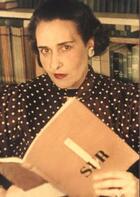
Ramona Victoria Epifanía Rufina Ocampo (Buenos Aires, April 7, 1890 – Beccar, January 27, 1979) was an Argentine writer, intellectual, essayist, translator, editor, philanthropist and patron. She published books such as La laguna of the water lilies (1926), ten volumes of Testimonies and Tagore in the ravines of San Isidro (1961).
Born into an aristocratic family, she was educated with governesses and her first language was French. In 1924 she published her first work, De Francesca a Beatrice, edited by Revista de Occidente with the help of José Ortega y Gasset. She participated from her youth in the first manifestations of the Argentine feminist, intellectual and anti-fascist movements, which led her to found the Argentine Women's Union in 1936.
Her travels allowed her to contact exponents of literature and the intellectual field. Encouraged by Waldo Frank and Eduardo Mallea, she founded the magazine and editorial Sur in 1931, which promoted the literary works of national and international authors such as Jorge Luis Borges, Adolfo Bioy Casares, Ernesto Sabato, Silvina Ocampo, Alejandra Pizarnik, José Bianco, Virginia Woolf , Carl Gustav Jung, Andre Malraux, T.E. Lawrence, Martin Heidegger, Jean Genet, E.M. Forster, Henri Michaux, Lanza del Vast, Henry Miller, Vladimir Nabokov, Robert Musil, Yukio Mishima, Georges Bataille, T. Adorno, Walter Benjamin, until the partial cessation of publication in 1971.
Although she was not part of the group, Sur magazine dedicated a special issue to Manuel Mujica Lainez, whose personal friend Victoria was and with whom she corresponded until a month before her death.
In 1941, he settled in his Villa Ocampo residence —today belonging to UNESCO—, which became a place of reception for figures such as Rabindranath Tagore, Albert Camus, Graham Greene, Ígor Stravinsky, Saint-John Perse, Denis de Rougemont, Pierre Drieu La Rochelle, Roger Caillois, Ernest Ansermet, Christopher Isherwood, and Indira Gandhi.
The only Latin American in one of the sessions of the Nuremberg Trials, she was a member of the opposition to Peronism, for which she was arrested for 26 days in 1953. As a philanthropist, during World War II she donated three tons of food and clothing to occupied countries by the Axis, particularly France.
She was president of the National Endowment for the Arts from 1958 to 1973 and received various distinctions as well as honorary doctorates from various universities. Among the most important distinctions are the decorations of Officier de La Légion d'Honneur and of Commandeur des Arts et des Lettres awarded in 1962 by the French government, the distinction of Commander of the Order of the British Empire awarded by Queen Elizabeth of the United Kingdom, the Médaille d'Or du Rayonnement Français awarded by the French Academy in 1965 and the Maria Moors Cabot Prize awarded in 1965 by Columbia University. In 1967 Harvard University made her Doctor Honoris Causa and in 1968 the Vishwa Bharati University of India awarded her the same title. In 1977, she became the first woman to be elected to the Argentine Academy of Letters.





